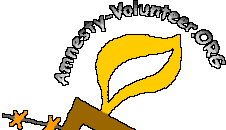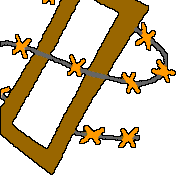
Home | Site Map | Internal | Public Resources | Hosted Groups
 |
Home | Site Map | Internal | Public Resources | Hosted Groups |

|
Amnesty International Campaign ManualOUTREACHTRADE UNIONS
In many societies trade unions and trade unionists are in the frontline of the human rights struggle, seeking respect for social and economic rights in particular, but often civil and political rights as well. This section looks at:
N Why trade unions are important to AI / 214 N Why trade unions might share AI's concerns / 214 N Developing an outreach strategy / 214 N Checklist: What you can ask trade unionists to do / 216
'Hand in hand for human rights' _ AI participation in a May Day rally in the Philippines © ai Why trade unions are important to AI Trade unions represent millions of people and can speak on their behalf in defence of human rights. They can also be an important political force influencing government action and public opinion. Many trade unions have extensive international networks, providing opportunities for dialogue, mutual support and which campaign on issues relevant to AI's campaigning work. They often have an organizational infrastructure that enables them to mobilize others and take action quickly.
Why trade unions might share AI's concerns N The principle of solidarity is at the heart of both AI and trade unionism. N Human rights are the basis of workers' rights. N Trade unionists in many societies are activists for other human rights. N Trade unionists in many countries are targeted for human rights violations because of their activities. N AI has acted on behalf of many trade unionists. N Many trade union officials and rank and file members are committed to human rights. N Trade unions share AI's concerns at the efforts of some governments to undermine the basis of international solidarity (specifically, the universality of human rights) and to question the validity of specific rights (indivisibility of human rights). In the Cold War years trade union federations and affiliations reflected wider ideological divisions. Sometimes this led to tensions in outreach to trade unions as AI was seen to be focusing on the rights of the individual, whereas the focus of trade unions is on collective rights. Many of these tensions have now disappeared and AI has a cooperative working relationship with the trade union movement at the international level. Preparations for the UN World Conference on Human Rights in Vienna in 1993 found AI and the trade union movement campaigning together against the efforts of governments to undermine the Universal Declaration on Human Rights.
Developing an outreach strategy
gQUESTIONS g What is the potential importance of outreach to trade unions for AI as an organization in your society and for its international campaigning?
g How is the trade union movement structured?
g What AI structure is best suited to your needs?
g Does or can the trade union movement in your society influence government policy and in particular its international relations policies?
g Do trade unions influence the position of particular political parties? g Which trade unions are most influential? Which have the most members?
g What international links does the trade union movement have with other trade unions?
g Do trade unions influence public opinion? How do the trade unions communicate with their membership and others (through newsletter, magazines, radio, etc)?
g Have trade unions previously stated support for AI's objectives? g Do trade unions have office space, printing facilities or other resources they may be willing to donate to AI?
g Do trade unions have the capacity to send appeals quickly (for example, via fax) to home and foreign governments?
g Can trade unions donate or help to collect funds for AI's work?
g What issues are of most concern to the union movement at present? g Do the different trade unions, or the trade union federations have officials/ members/a committee who are responsible for international relations or links?
g How do the different unions take decisions on the issues of importance to AI? Is it at an annual meeting, in response to resolutions at executive meetings or the position of key officials, etc?
g Will maintaining regular or occasional contact with key trade union members/officials achieve most of what AI needs?
g Can AI members who are trade union members win their union's support for AI generally and on specific issues?
g Is there enough potential support from the trade union movement or is the trade union movement influential enough to justify establishing a permanent outreach structure?
g Is there enough expertise within AI or should sympathetic trade unionists be recruited to advise AI on its strategy and relations with the trade union movement?
g What resources can AI realistically devote to establishing and maintaining a permanent structure or to servicing AI's trade union members?
jCHECKLIST What you can ask trade unionists to do
j Join the UA network. Many trade unions have secretarial support and faxes, and appeals on headed paper can have more impact. Perhaps use a single UA on the case of a trade unionist to introduce them to the scheme. Many journalists' unions are asked by their international federation to take action on behalf of journalists featured in UAs. In a number of AI Sections, trade unions agree to act on all or some UAs _ sometimes on particular countries, occupations or trade unions.
j Donate a monthly sum of money.
j Run a regular column or advertisement in their publication featuring AI's campaigns and asking for action (time or money).
j Take action in relation to specific campaigns, such as writing to governments at home or abroad in support of AI's calls. j Pass a resolution on a human rights issue and forward a copy to the embassy of the country. j Display AI posters/leaflets in their offices.
j Include human rights education training in educational programs they run.
Direct action In 1987 members of the Furniture Timber and Allied Trades Union in the UK campaigned against the export of gallows to Abu Dhabi in the United Arab Emirates. Workers at the docks from which the gallows were supposed to be dispatched helped to ensure that two sets of gallows were not exported.
Every year AI seeks to lobby national trade union delegations attending the annual meeting of the International Labour Organisation in Geneva.
AI's aims in relation to trade unions AI's work with national and international trade unions aims to: N maximize impact in protecting and promoting human rights _ for labour rights activists and the general population _ in countries where human rights are violated; N exchange information on human rights violations and the means of combating them; N maximize impact at the International Labour Organisation (ILO), initiating appropriate criticism of human rights violations of working people; N achieve full ratification of ILO Conventions No. 87 and No. 98, on freedom of association and the right to organize.
We just told them it was fun... The German Section's trade union co-group was re-formed in September 1995. Within weeks articles about AI and UAs were published in trade union newspapers. By November IG Metall, the largest trade union in the world, hosted a concert which raised nearly US$100,000 for AI. The group is planning courses for trade unionists on trade union and human rights. Their recipe for success was simple. In the words of the coordinator: “We never wrote about structures of the organization, never gave reports about boring meetings and never talked about the difficulties we had. We always repeated that we are only a few members who are interested in trade union work, but we also pointed out that our group grows, that we have success and a lot of fun. I think this was the method to get the success we have today.”
Every year there is an action around International Labour Day (1 May) and a lobbying action before annual meetings of the ILO. AI members who are also active in a trade union could try to develop an outreach structure or an ongoing outreach program to trade unionists, if resources are available.
Swedish initiative In 1996 a delegation from the Swedish Section met the presidents of both the white and blue collar national trade union federations. All agreed that they shared a similar view of the state of the world, including the increasing danger for human rights and the rights of trade unionists. It was confirmed that a more intense cooperation should be developed, chiefly in the form of networks of activists in the two federations. Since then the Urgent Action network has increased immensely.
International solidarity Muchtar Pakpahan, the leader of an independent trade union in Indonesia, was sentenced to four years' imprisonment in January 1995 for his trade union activities. AI worked with both national and international trade unions, ensuring press coverage and a huge volume of appeals. In the run-up to the International Labour Conference (ILC) in June that year, Muchtar Pakpahan was released _ ostensibly on a legal technicality. Because his release was not confirmed as permanent, the work on his behalf continued. Delegates to the ILC used AI information which had been sent to them by the Sections in their country and was handed out by the lobbyist at the meeting. The ILC condemned the violations of workers' rights in Indonesia. In October the Indonesian Supreme Court acquitted Muchtar Pakpahan of the charges against him. Despite the rearrest of Muchtar Pakpahan following riots in Jakata in 1996, international trade union support for him has helped to keep his case in the public eye.
“We think that pressure from unions on the US Government on the issue of the right to form independent trade unions was effective in pressuring Indonesia and led to Muchtar Pakpahan's release.” AIUSA
Amnesty International Campaign Manual
|